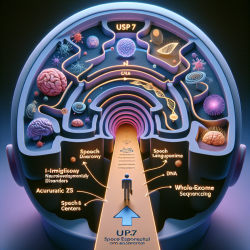Understanding Hao-Fountain Syndrome and Its Implications for Practitioners
As a practitioner dedicated to improving outcomes for children, staying informed about rare genetic disorders is crucial. The recent case study titled "A Rare Case of Hao-Fountain Syndrome Mimicking Fragile X Syndrome" provides valuable insights into the diagnostic challenges and management of Hao-Fountain Syndrome (HAFOUS), a rare neurodevelopmental disorder caused by mutations in the USP7 gene.
The Case at a Glance
The study presents an 18-year-old female with intellectual disability (ID), ADHD, and dysmorphic facial features. Initially misdiagnosed due to overlapping symptoms with Fragile X Syndrome (FXS), her condition was later correctly identified as HAFOUS through whole-exome sequencing (WES). This highlights the importance of advanced genetic testing in diagnosing rare conditions.
Key Takeaways for Practitioners
- Genetic Testing: The case underscores the necessity of using comprehensive genetic testing methods like WES to uncover rare genetic disorders that might mimic more common conditions.
- Interdisciplinary Approach: Collaboration among primary care, neuropsychology, and genetics specialists is essential for accurate diagnosis and management.
- Symptomatic Management: While there are no standardized treatment guidelines for HAFOUS, symptomatic management, including pharmacotherapy for ADHD, remains crucial.
Encouraging Further Research
Practitioners are encouraged to delve deeper into the genetic underpinnings of neurodevelopmental disorders. Understanding the genetic basis can lead to more tailored interventions, improving patient outcomes. Additionally, exploring the pharmacogenomics of HAFOUS could provide insights into drug responsiveness, further enhancing treatment efficacy.
Conclusion
Hao-Fountain Syndrome, though rare, presents significant diagnostic challenges due to its symptom overlap with conditions like FXS. Practitioners must consider HAFOUS in their differential diagnoses, especially when genetic testing for more common disorders returns negative. By staying informed and utilizing advanced genetic testing, practitioners can significantly improve diagnostic accuracy and patient outcomes.
To read the original research paper, please follow this link: A Rare Case of Hao-Fountain Syndrome Mimicking Fragile X Syndrome.










